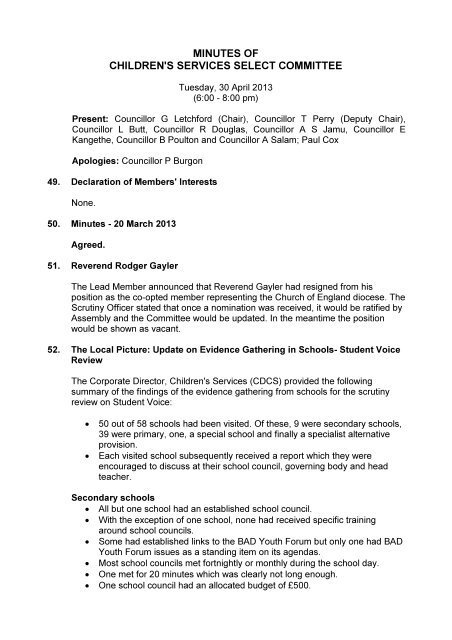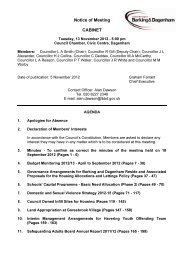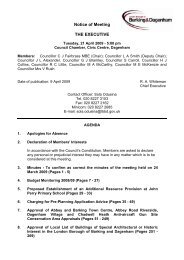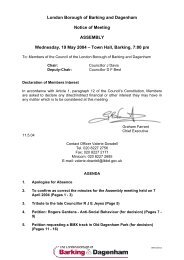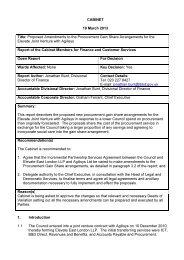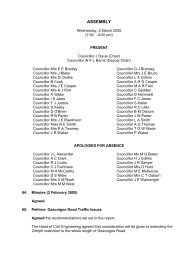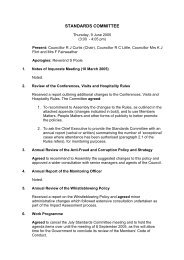Meetings, agendas, and minutes
Meetings, agendas, and minutes
Meetings, agendas, and minutes
You also want an ePaper? Increase the reach of your titles
YUMPU automatically turns print PDFs into web optimized ePapers that Google loves.
MINUTES OF<br />
CHILDREN'S SERVICES SELECT COMMITTEE<br />
Tuesday, 30 April 2013<br />
(6:00 - 8:00 pm)<br />
Present: Councillor G Letchford (Chair), Councillor T Perry (Deputy Chair),<br />
Councillor L Butt, Councillor R Douglas, Councillor A S Jamu, Councillor E<br />
Kangethe, Councillor B Poulton <strong>and</strong> Councillor A Salam; Paul Cox<br />
Apologies: Councillor P Burgon<br />
49. Declaration of Members' Interests<br />
None.<br />
50. Minutes - 20 March 2013<br />
Agreed.<br />
51. Reverend Rodger Gayler<br />
The Lead Member announced that Reverend Gayler had resigned from his<br />
position as the co-opted member representing the Church of Engl<strong>and</strong> diocese. The<br />
Scrutiny Officer stated that once a nomination was received, it would be ratified by<br />
Assembly <strong>and</strong> the Committee would be updated. In the meantime the position<br />
would be shown as vacant.<br />
52. The Local Picture: Update on Evidence Gathering in Schools- Student Voice<br />
Review<br />
The Corporate Director, Children's Services (CDCS) provided the following<br />
summary of the findings of the evidence gathering from schools for the scrutiny<br />
review on Student Voice:<br />
• 50 out of 58 schools had been visited. Of these, 9 were secondary schools,<br />
39 were primary, one, a special school <strong>and</strong> finally a specialist alternative<br />
provision.<br />
• Each visited school subsequently received a report which they were<br />
encouraged to discuss at their school council, governing body <strong>and</strong> head<br />
teacher.<br />
Secondary schools<br />
• All but one school had an established school council.<br />
• With the exception of one school, none had received specific training<br />
around school councils.<br />
• Some had established links to the BAD Youth Forum but only one had BAD<br />
Youth Forum issues as a st<strong>and</strong>ing item on its <strong>agendas</strong>.<br />
• Most school councils met fortnightly or monthly during the school day.<br />
• One met for 20 <strong>minutes</strong> which was clearly not long enough.<br />
• One school council had an allocated budget of £500.
• In most schools, students contribute to the agenda.<br />
• Feedback was given in the form of <strong>minutes</strong> (written by a student clerk), via<br />
Assembly <strong>and</strong> newsletters.<br />
• Most schools had developed strategies to address problems raised in their<br />
meetings. For example, one school faced an issue around the school bus<br />
<strong>and</strong> contacted the CDCS requesting that she write a letter to help address<br />
the issue, which she had done.<br />
• In most schools students do feel that they receive explanations from school<br />
leaders for decisions <strong>and</strong> outcomes.<br />
• Very few school councils had direct contact with their governors.<br />
• Some schools additionally empowered the student voice by involving them<br />
with staff interviews, allowing them to observe lessons, <strong>and</strong> via surveys <strong>and</strong><br />
questionnaires.<br />
• Most schools demonstrated that they valued diversity.<br />
Primary schools<br />
• The ratings for seven schools were currently being finalised.<br />
• The majority appointed students to their school councils on the basis of<br />
elections with secret ballots by their peers.<br />
• Some school councils met during the school day <strong>and</strong> some met after<br />
school; however, those doing the latter usually saw a drop in attendance.<br />
• Generally, students recognise that decision making lies with the head<br />
teacher.<br />
• Feedback on action was given in classrooms <strong>and</strong> through notice boards.<br />
• The kind of issues being considered by school councils was promoting<br />
healthy food, bullying <strong>and</strong> religious diversity.<br />
• Schools had benefitted from visits to the Council's Town Hall chamber<br />
where Democratic Services gave presentations on local democracy last<br />
year.<br />
• School councils promoted values such as kindness, support <strong>and</strong> challenge.<br />
• They focussed on both the positive <strong>and</strong> negative things happening in their<br />
school <strong>and</strong> importantly, looked at how to improve the negative aspects.<br />
• They understood the role of teachers; for example, in relation to controlling<br />
behaviour, so everybody could learn.<br />
Main achievements<br />
• The main achievements of primary schools were around improving play<br />
facilities, consideration of the environment, school lunches, fund raising for<br />
charity, school transport, gardening <strong>and</strong> recycling.<br />
• Some highlights for secondary schools were participating in the teacher<br />
appointment process <strong>and</strong> evaluating teaching.<br />
The full report on this work would be shared with members soon. All schools would<br />
receive their individual report <strong>and</strong> the really positive thing about this work was that<br />
there were areas for improvement for all schools. The few schools who had not<br />
participated yet were being followed up. Three of these had requested to do<br />
conduct the visit after the Easter holidays, one had cancelled after the relevant<br />
member of staff went off sick <strong>and</strong> one stated that it was too busy to participate.<br />
The CSCD stated that she may raise this at the next meeting with head teachers if<br />
felt appropriate.<br />
The Lead Member stressed the need for the Committee to be provided the report
<strong>and</strong> the CDCS stated that this would be done as soon as possible.<br />
The CDCS stated that this review was an example of really good scrutiny practice<br />
as it was an issue highlighted by a young person (Paul Cox) which local<br />
councillors listened to, resulting in recommendations which could practically be<br />
implemented to improve student voice, based on thorough evidence. The<br />
Committee commended officers <strong>and</strong> the schools that took part for their efforts in<br />
doing this review <strong>and</strong> looked forward to shaping the draft Student Voice Report in<br />
due course.<br />
53. Education St<strong>and</strong>ards<br />
The Divisional Director, Education (DDE) presented the report, ' Summary of the<br />
Borough’s Performance in the summer 2012 Public Examinations <strong>and</strong> National<br />
Tests – Primary <strong>and</strong> Secondary Schools' <strong>and</strong> the Committee noted the<br />
achievements as well as the areas for improvement. As part of this she<br />
emphasised the national problems this year around the changes made to grade<br />
boundaries in GCSE English between January <strong>and</strong> June 2012, which have been<br />
well publicised. In Barking <strong>and</strong> Dagenham this affected around 170 young people<br />
(8% of the cohort) who achieved a grade D in English rather than the grade C<br />
forecast, which has meant great disappointment for a number of students.<br />
In response to questions <strong>and</strong> comments from the Committee, the DDE stated the<br />
rationale behind the grade boundary change was aimed at keeping up with<br />
international st<strong>and</strong>ards; however, she agreed that it was morally wrong to do this<br />
in the way that it was done, which could have meant students sitting the exam in<br />
January were more likely to get a higher grade than those sitting it in the summer.<br />
A discussion took place regarding the relationship between budgets <strong>and</strong> pupil<br />
place numbers. The DDE stated that schools' budgets were protected <strong>and</strong> primary<br />
schools had a seen a better injection into their finances. Schools' finances were in<br />
reasonably good positions. This helped to ensure that schools had enough places.<br />
The most common reason why some parents were refused their first choice was<br />
because they applied late. 75 percent of schools had exp<strong>and</strong>ed to meet local<br />
needs; however, the DDE accepted that there would be increasing challenges with<br />
regards to the number of places going forward.<br />
The CDCS added that there had been an increase in the birth rate over the years<br />
but due to good pupil place management by governing bodies <strong>and</strong> head teachers<br />
schools were able to deal with the increase. However, in future, if there were<br />
constraints on budgets, this would present a problem. She stated that it would be<br />
essential to look at all sources of revenue to support infrastructure, particularly<br />
where new homes were being built. Furthermore, there was likely to be less<br />
impact on families who are refused their first choices next year due to there being<br />
school places available in Barking, Dagenham <strong>and</strong> in areas in the middle of both<br />
parts of the Borough. However, parents should be encouraged to name, in order,<br />
what their six preferences are. Naming only their first or second school choice may<br />
cause difficulties further down the line.<br />
In summary, a high proportion of good <strong>and</strong> outst<strong>and</strong>ing practice was seen. Urgent<br />
recommendations were made to four schools, which were already being<br />
addressed. The recommendations made by the Committee had been collated <strong>and</strong><br />
would be reflected in its scrutiny report on student voice.
The Lead Member thanked the DDE for her briefing <strong>and</strong> attendance.<br />
54. Children in Care Council (Skittlz)<br />
The Group Manager, Engagement & External Services (GMEES), delivered a<br />
presentation to compliment the report for this item <strong>and</strong> welcomed the Lead<br />
Member to add to the presentation if he wished, due his involvement with the<br />
Children in Care Council (CiCC), Skittlz. Of note:<br />
Context<br />
The premise behind establishing a CiCC comes from a number of places including<br />
the Children’s Act 1989, the Care Matters agenda, the Children <strong>and</strong> Young<br />
Person’s Act 2008 <strong>and</strong> the Munro review.<br />
Our Children in Care Council<br />
The Borough's CiCC was established in 2007, <strong>and</strong> is made up of ten members<br />
(including care leavers), aged 9-21. It meets at least once a month, <strong>and</strong> has links<br />
to the Members’ Corporate Parenting Group <strong>and</strong> the 7-11 <strong>and</strong> 12-16 Looked After<br />
Children (LAC) groups. One of the ways they obtain the views of non CiCC<br />
members was through an annual questionnaire.<br />
Local achievements<br />
Achievements of the CiCC include the 'CiC pledge' or 'promise' which outlined how<br />
the Council would try to ensure the best support for children in care (CiC). After<br />
consultation the CiCC developed <strong>and</strong> promoted a ‘menu of choice’, which allows<br />
children <strong>and</strong> young people more choice over how their review should take place. It<br />
also reviewed the Children in Care Guide, that is given to all children <strong>and</strong> young<br />
people that come into care <strong>and</strong> provided consultation support for the development<br />
of the CiC website (www.careweb.tv) with regards to colour, layout <strong>and</strong> content.<br />
The new website was launched in 2012, <strong>and</strong> work is nearly complete to allow CiC<br />
to input into reviews electronically, via the website. Finally, the Children’s Rights<br />
<strong>and</strong> Participation Team have recently reintroduced out of borough ‘have your say’<br />
days entitled across four locations regionally.<br />
National achievements<br />
Members of our CICC have been proactive in a number of national initiatives,<br />
outlined in the report.<br />
National comparators<br />
Comparisons to the national picture leads to the following positive conclusions<br />
about this Borough's CiCC:<br />
o The CICC is well established <strong>and</strong> fully functioning<br />
o It has a budget to promote its work <strong>and</strong> influence service improvement.<br />
o Both the Lead Member <strong>and</strong> Director regularly attend <strong>and</strong> contribute to the<br />
CICC meetings.<br />
Key challenges <strong>and</strong> priorities<br />
o Supporting a young person to take on the role of Chair of the Borough's<br />
CICC over the coming year.<br />
o Skittlz falls just short of the Child’s Right Director for Engl<strong>and</strong>'s
ecommendation that CICCs should comprise 12 young people- we must<br />
make a concerted effort to meet this recommendation <strong>and</strong> exceed it.<br />
o Some common challenges nationally include ensuring that the CICC<br />
reached out of borough looked after children, measuring success <strong>and</strong><br />
impact of the work undertaken <strong>and</strong> ensuring clear messages were fed back<br />
to Social Care <strong>and</strong> the borough's CICC has encountered some similar<br />
difficulties- this will be an area for development over the next six months.<br />
o Strengthen systems for social care to take the messages back to front line<br />
practitioners so that practice can be improved.<br />
A short discussion followed during which the GMEES stated, in response to a<br />
question, that he would check whether the Annual Review included an analysis for<br />
children cared for within <strong>and</strong> out of the borough <strong>and</strong> bring a detailed breakdown of<br />
this to a future meeting.<br />
55. Children's Social Care Reviews<br />
The Corporate Director, Children's Services (CDCS) presented the Report, which<br />
provided a review of significant operational service developments <strong>and</strong> inspections<br />
over the past 18 months within the Complex Needs <strong>and</strong> Social Care teams. The<br />
report provided a summary of what was a huge area. This area of work was very<br />
complex <strong>and</strong> was known to be very challenging. Last year saw a large increase in<br />
the number of children referred to these Services <strong>and</strong> recent years saw a rise in<br />
the child population, putting significant pressure on case loads.<br />
The CDCS outlined both the strengths <strong>and</strong> areas for improvement in these<br />
services <strong>and</strong> a discussion then took place around these. Of note:<br />
• It was difficult to promote positive aspects of the Council's work with regards<br />
to these services in the press; however, the work was promoted to partners<br />
<strong>and</strong> the public in other ways where possible.<br />
• There were a number of areas where performance was under 100 percent<br />
including the timeliness of looked after children reviews, the recording of<br />
ethnicity at the referral stage, <strong>and</strong> a backlog of unauthorised assessments<br />
in 2012/13 <strong>and</strong> these were being urgently addressed.<br />
• With regards to timescales around the adoption process, legal proceedings<br />
were the main issue as officers often had to go back to court three or four<br />
times. There was the view that if the child is going to be adopted, the<br />
sooner they are living with their adoptive family, the better.<br />
• One common factor behind time lags was parents not being able to<br />
continue the level of effort they put in initially in order to keep their children.<br />
The statistics showed that the life chances of those taken into care were<br />
worse than those who were not. The balance was very difficult to achieve.<br />
• The cost associated with taking a child into care depended on the<br />
circumstances of each case but the average cost may be approximately<br />
£20,000 per case on legal fees, making the process of going back to court<br />
repeatedly all the more frustrating.<br />
• The CDCS was certainly not aware of untrained staff working on visits on<br />
their own unless it was in accordance with good practice in terms of<br />
personal development <strong>and</strong> the member of staff was ready. She urged<br />
members to report anything of concern to her directly.
The CDCS then took the Committee through the Safeguarding <strong>and</strong> Looked After<br />
Children Multi-agency Action Plan. She explained that actions were Red Amber<br />
Green (RAG) rated, which meant that actions would not be rated 'green' until a<br />
difference could be seen in outcomes. She added that the Services were in the<br />
middle of implementing some of the actions at the moment, which was monitored<br />
by the Local Safeguarding Children Board (LSCB). A report would be drafted at<br />
the end of May <strong>and</strong> any issue not rated 'green' would be raised at the LSCB,<br />
Health <strong>and</strong> Wellbeing Board <strong>and</strong> Children's Trust.<br />
In response to a question the CDCS stated that young people were supported to<br />
become independent for as long as they needed. Many foster carers supported the<br />
children they looked after long after the child had left their care, which was not<br />
always easy as foster carers managed budgets for children up until they were 18<br />
years of age. Fostering was a key strength in this borough <strong>and</strong> had been rated<br />
'outst<strong>and</strong>ing'.<br />
The Select Committee agreed that the CDCS would report progress in relation to<br />
the SLAC at some point in the new municipal <strong>and</strong> the Scrutiny Officer agreed to<br />
place this on the Work Programme.<br />
Members suggested that the Committee's work programme for next year include<br />
inviting a foster carer to discuss their experiences with the Committee, which the<br />
Lead Member said would be considered.<br />
56. Any other business<br />
The Lead Member asked the Scrutiny Officer to look into the issue of low<br />
attendance of statutory co-opted members of the Committee.<br />
Annual Assembly would appoint the members of this Committee on 15 May 2013,<br />
with the exception of his position of Lead Member, which was a two year<br />
appointment. He asked members to note that it was likely that the Committee's<br />
work programme for the next municipal year would require more commitment than<br />
last year.<br />
He thanked members for their contributions over the past municipal year.<br />
57. Date of Next Meeting<br />
Noted.


